The All-Sustaining Air: Romantic Legacies and Renewals in British, American, and Irish Poetry Since 1900 » książka
The All-Sustaining Air: Romantic Legacies and Renewals in British, American, and Irish Poetry Since 1900
ISBN-13: 9780199299287 / Angielski / Twarda / 2007 / 224 str.
The All-Sustaining Air: Romantic Legacies and Renewals in British, American, and Irish Poetry Since 1900
ISBN-13: 9780199299287 / Angielski / Twarda / 2007 / 224 str.
(netto: 490,11 VAT: 5%)
Najniższa cena z 30 dni: 499,45
ok. 30 dni roboczych.
Darmowa dostawa!
Drawn from Shelley's Prometheus Unbound, the title of this book suggests the cultural and literary persistence of the Romantic in the work of many British, American, and Irish poets since 1900. Allowing for and celebrating the multiple, even fractured nature of Romantic legacies, Michael O'Neill focuses on the creative impact of Romantic poetry on twentieth- and twenty-first century poetry. Individual chapters embrace numerous authors and texts, and span different cultures; the intention is not the forlorn hope of completeness, but the wish to open up possibilities and intersections, and there is a strong sense throughout of poetry serving as a subtle and profound form of literary criticism.
A wide-ranging introduction analyses the persistence of the Romantic in poets such as Ted Hughes, Wilfred Owen, Robert Frost, Denise Levertov, Robert Lowell, and others, and sets the scene for subsequent discussions. Chapter 1 dwells on images of 'air', using these to understand the efforts of a number of twentieth-century poets to 'sustain' Romanticism, or forms of it. Chapters 2 and 3 focus on Yeats and Eliot, respectively, the latter apparently shunning the Romantic, the former seeming to embrace it, but both responding with subtlety and individuality to the Romantic bequest. Chapter 4 argues that Wallace Stevens's 'Esthetique du Mal' should be read as a work that illuminates the writings of the major Romantics, especially about evil and suffering. Chapter 5 discusses the work of W. H. Auden and Stephen Spender, exploring the complex response of both poets to the Romantic, Auden complicated in his post-Romantic attitudes, Spender daring in his attempts to renew a Romantic lyricism in a post-Romantic age. Chapter 6 returns to a broader sweep as it investigates the response of a range of contemporary poets from Northern Ireland, including Heaney, Kavanagh, Mahon, and Carson, to Romantic poetry. Chapter 7 sustains the Irish connection, discussing Paul Muldoon's dealings with Byron and other Romantics, especially in Madoc. And Chapter 8 focuses on Geoffrey's Hill's tense and tensed relations with Romantic poetry, and on Roy Fisher's sense of being a 'gutted Romantic', in order to illustrate two diverse ways of being post-Romantic in contemporary culture.











